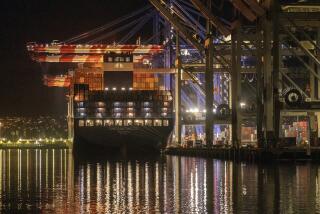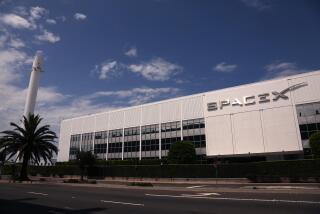In Washington, Saluting the Wrong Ocean : Californians like Warren Christopher see the need for an Asia-focused policy but can’t get the blinkers off the rest of official Washington.
WASHINGTON — The East Coast isn’t so bad. Lincoln Center in New York, Kennedy Center in Washington, terrific restaurants in both cities--pretty impressive. And on the 11 or so days a year that the weather is actually merciful enough to allow strolling, they have those promenades and nice parks; plus there’s that storied sense of tradition. So let’s allow East Coasters their good points.
But just ask them for certain courtesies, such as some honest perspective on U.S. foreign policy and respect for the towering importance of Asia and California, and suddenly you’re from Mars. Some Easterners, remember, still tend to think of California as the land of fruits and nuts, when it’s as much the breeder of Silicon Valley geniuses and the mammoth Hollywood economic engine as anything else. Worse yet, anyone east of the Rockies tends to think of Asia, when they think of it at all, in cliche terms best left to comic books of the Eisenhower era (a time when Asia was at least as ignored, but with fewer potential consequences) The result is an antiquated U.S. foreign policy that obsesses about the future of the Atlantic Alliance, hyperventilates about what French President Jacques Chirac’s next blowhard statement will be (who cares?), and sometimes even talks as if England (still a wonderful place to visit, by the way) were a major power.
Too bad. History is about to say sayonara to the East Coast--it is rolling westward, like some huge Hegelian force, across the United States, pausing for breath in California, catching a few waves near Hawaii and then blowing ashore in the Far East. To settle and center itself where? Hong Kong? Beijing? Tokyo? Jakarta? Any of these--it won’t be Chicago or Brussels. And, you know what? For too long now the East Coast has been in denial.
“American foreign policy has indeed suffered from a long period of neglect regarding the Pacific,” Warren Christopher told me last week. “We really have had a Eurocentric approach and failed to take account of the importance of Asia.” Moreover, the Secretary of State believes strongly that Washington provincialism and East Coast Atlanticism will continue to impede a savvier foreign policy, even though a global shift is occurring. “Asia offers the most important set of trade relationships, certainly in terms of growth. It is the world’s most dynamic area, and American foreign policy has not been putting enough energy, drive or resources into its Pacific policy.”
Christopher is a modest man, the last to publicly knock anyone. But as a troublemaking California columnist, I wanted to stir things up a little. I said something like: “Easterners think of themselves as all Park Avenue sophistication, but their Washington tunnel vision in effect puts foreign policy blinders on them.”
It was my lucky day--Christopher was in a mood to wax philosophical about it: “Geography has a lot to do with your perspective on things. Living in California all those years helped. And serving in the Navy [in the Pacific during World War II] helped me realize long ago how important it was for the U.S. to remain a Pacific power. They don’t see that as clearly in the East Coast.”
Fellow California-perspectivist Mickey Kantor, President Clinton’s hard-charging U.S. Trade Representative, agrees. He says bluntly that Washingtonians (and the national media, too) are insane to ignore Asia and Latin America as much as they do. With the rush of a stock ticker, he rattled off in his Washington office some amazing stats: --U.S. exports to member nations of the Asia-Pacific Economic Cooperation forum (which includes Canada and Mexico as well as all the bigger Asian-Pacific economies), add up to 62.5% of America’s total worldwide in 1994;
--Imports from the same countries add up to two-thirds of the U.S. total;
--55% to 60% of the growth in the world economy over the next 10 years will be created in East Asia.
Says Kantor: “America has not shifted its focus from the Cold War. You know where our real strategic concerns are? They’re in Asia--China, Japan, Korea. And maybe you only know that by coming from California. It makes you look at foreign policy with more sensitivity, more involvement. We’re all victims and beneficiaries of what we’re exposed to. To understand the future, it helps to have come from California. Chris [Secretary of State Christopher] sees this clearly; so does Laura [Tyson, chair of the President’s Council of Economic Advisors]. We’re all from California, the three of us. We know, because we have lived with it, with all those different Asian communities, the power of the Pacific. But not here in the East. Washington is Eurocentric--the majority in power came out of the European culture. The Pacific, for better or for worse, is our destiny.”
Sounds good to me. But what do I know? I’m only a Californian.
More to Read
Sign up for The Wild
We’ll help you find the best places to hike, bike and run, as well as the perfect silent spots for meditation and yoga.
You may occasionally receive promotional content from the Los Angeles Times.






